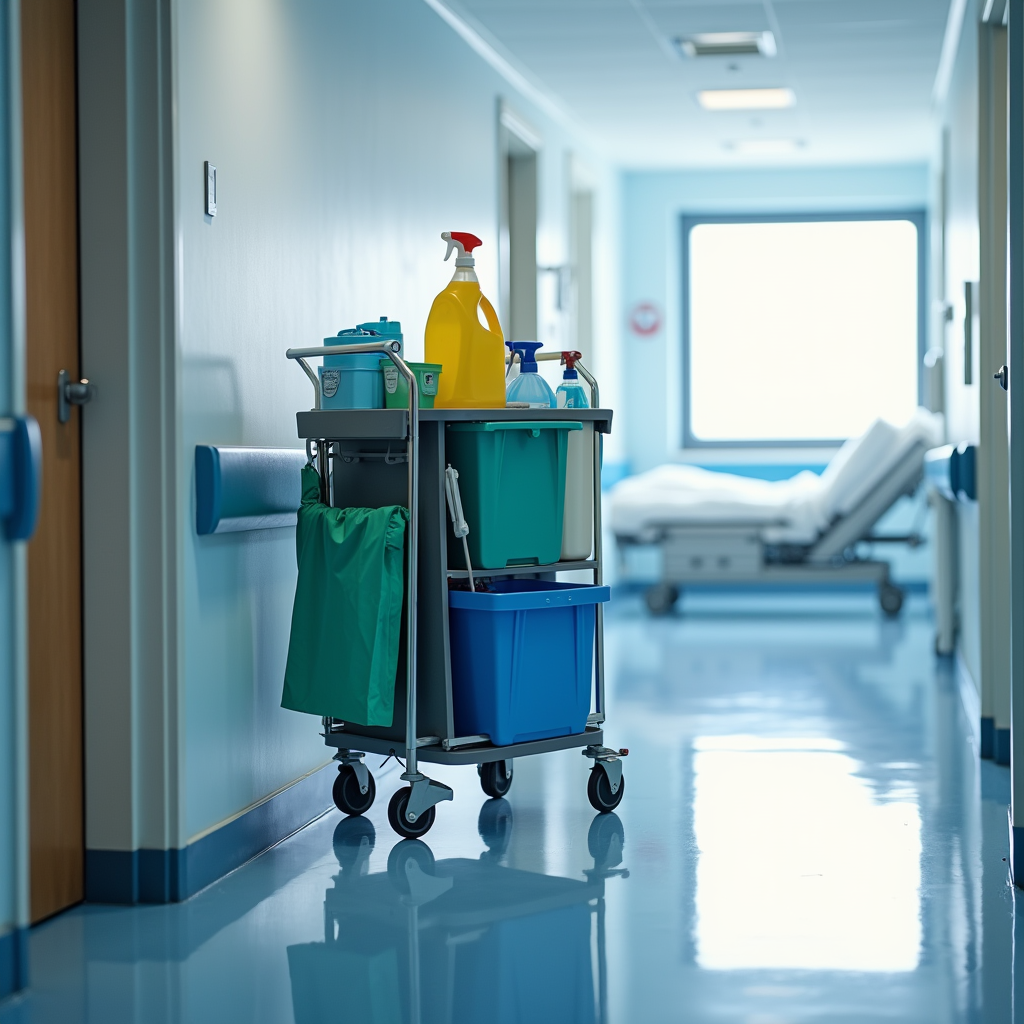
Studies have shown that enhanced hospital cleaning protocols can significantly reduce the risk of healthcare-associated infections, with some reports indicating reductions of up to 30% depending on the setting and practices in place. As a hospital cleaner, your work plays a vital role in supporting patient care by maintaining a safe and sanitary environment—an essential contribution to the healthcare team’s efforts. This article highlights why hospital cleaning is so important, the real impact you can make, and what you can expect from this rewarding and vital career path.
In medical environments, keeping things clean isn’t just about making things look nice—it’s about protecting health and saving lives. Janitorial professionals in hospitals play a critical role in preventing the spread of harmful germs and creating a safe space for patients and staff. In this article, we’ll walk through the role of hospital cleaning in infection control, the unique challenges and skills involved, the high standards you’ll be trained to meet, and some of the cutting-edge tools you might use. We’ll also talk about how your work directly influences patient satisfaction—and why that matters.
Become a Frontline Defender Against Infection
When you take a job in hospital cleaning, you’re stepping into one of the most important roles in the fight against hospital-acquired infections (HAIs). According to the Centers for Disease Control and Prevention (CDC), about 1 in 31 hospital patients gets an HAI every day. That number drops dramatically—up to 30%—when trained janitorial teams follow strong cleaning routines.
You’ll be trained to sanitize high-touch surfaces like door handles, nurse call buttons, and medical equipment—areas where germs can quickly spread. Hospitals follow strict cleaning protocols from the CDC and the World Health Organization, so your work will follow proven science and make a real difference.
What Makes Hospital Cleaning Unique—and Challenging
Working in a hospital is very different from cleaning in other settings. Hospitals never close, so you’ll be working around doctors, nurses, patients, and visitors. It’s a fast-paced, dynamic environment where your ability to be efficient, discreet, and thorough is highly valued.
You’ll also be trained to safely handle potentially hazardous materials. That might include blood or other bodily fluids in certain areas. Proper training ensures you can do your job safely while protecting others.
Time management is also key. Some areas need to be cleaned multiple times a day, especially those with high traffic. Being able to work quickly while still following detailed procedures will make you stand out as a strong team member.
You'll Follow High Standards—and Be Proud of It
In this field, you’ll follow professional guidelines set by organizations like OSHA and the CDC. Hospitals create detailed cleaning plans that outline how often different areas should be cleaned, what products to use, and what steps to take. You’ll learn all of this during onboarding and on-the-job training.
Sensitive areas like operating rooms and intensive care units require the most advanced cleaning practices, including what’s known as terminal cleaning—a deep, thorough cleaning done after medical procedures. You’ll be part of a team that ensures these spaces are safe and ready for the next patient.
To keep standards high, many hospitals also do regular audits of cleaning procedures. These evaluations help support staff and make sure that everyone is working efficiently and effectively.
Experience the Latest Innovations in Cleaning
Hospital janitorial work is evolving thanks to new tools and technologies. Some hospitals are turning to green cleaning products that are safer for people and better for the environment—so you won’t be working with harsh chemicals all day. This helps improve the air quality for everyone in the building.
Robotics is also starting to play a role. Some hospitals use cleaning robots to help with floor sanitation, and others use UV light technology to disinfect rooms quickly and effectively. As someone entering the field, you may get the chance to work with or alongside these advanced tools.
Infection control software is another exciting development. It helps track cleaning tasks and ensures procedures are followed correctly—adding accountability and helping your team succeed.
You’ll Help Patients Feel Safe and Cared For
Cleanliness is one of the top things patients notice in a hospital. Studies show that a well-maintained space boosts their overall satisfaction and even their trust in the care they receive. That means your work directly impacts how people feel about the hospital—and can even affect the hospital’s reputation and funding.
Many hospitals survey patients about their experience, and cleanliness is always one of the top-rated concerns. When people see that their room is spotless, the floors are shining, and the bathrooms are fresh, they feel more comfortable and respected. That’s something you can take pride in every day.
A Job With Purpose and Stability
If you’re looking for a job that offers stability, meaningful work, and the chance to grow, hospital janitorial cleaning is a great choice. You’ll gain specialized training, work in an essential field, and become a valued member of the healthcare team. As hospitals continue to raise standards and adopt new technologies, the role of janitorial professionals will only grow in importance.
By choosing this career path, you're not just keeping a facility clean—you’re keeping people safe, supporting patient care, and helping healthcare systems run smoothly. It’s work that truly makes a difference.
This article is intended for general informational purposes only and does not constitute medical, legal, or professional advice. While efforts have been made to ensure the accuracy of the content, readers should consult appropriate healthcare or industry professionals before making decisions related to hospital cleaning careers, infection control practices, or healthcare facility standards. The information provided may not reflect the most current research or guidelines.
Resource Links
https://aricjournal.biomedcentral.com/articles/10.1186/s13756-024-01489-z
https://aricjournal.biomedcentral.com/articles/10.1186/s13756-023-01274-4
https://www.cdc.gov/healthcare-associated-infections/hcp/cleaning-global/introduction.html
https://pmc.ncbi.nlm.nih.gov/articles/PMC9944767/
https://www.ajicjournal.org/article/S0196-6553%2822%2900357-1/fulltext

